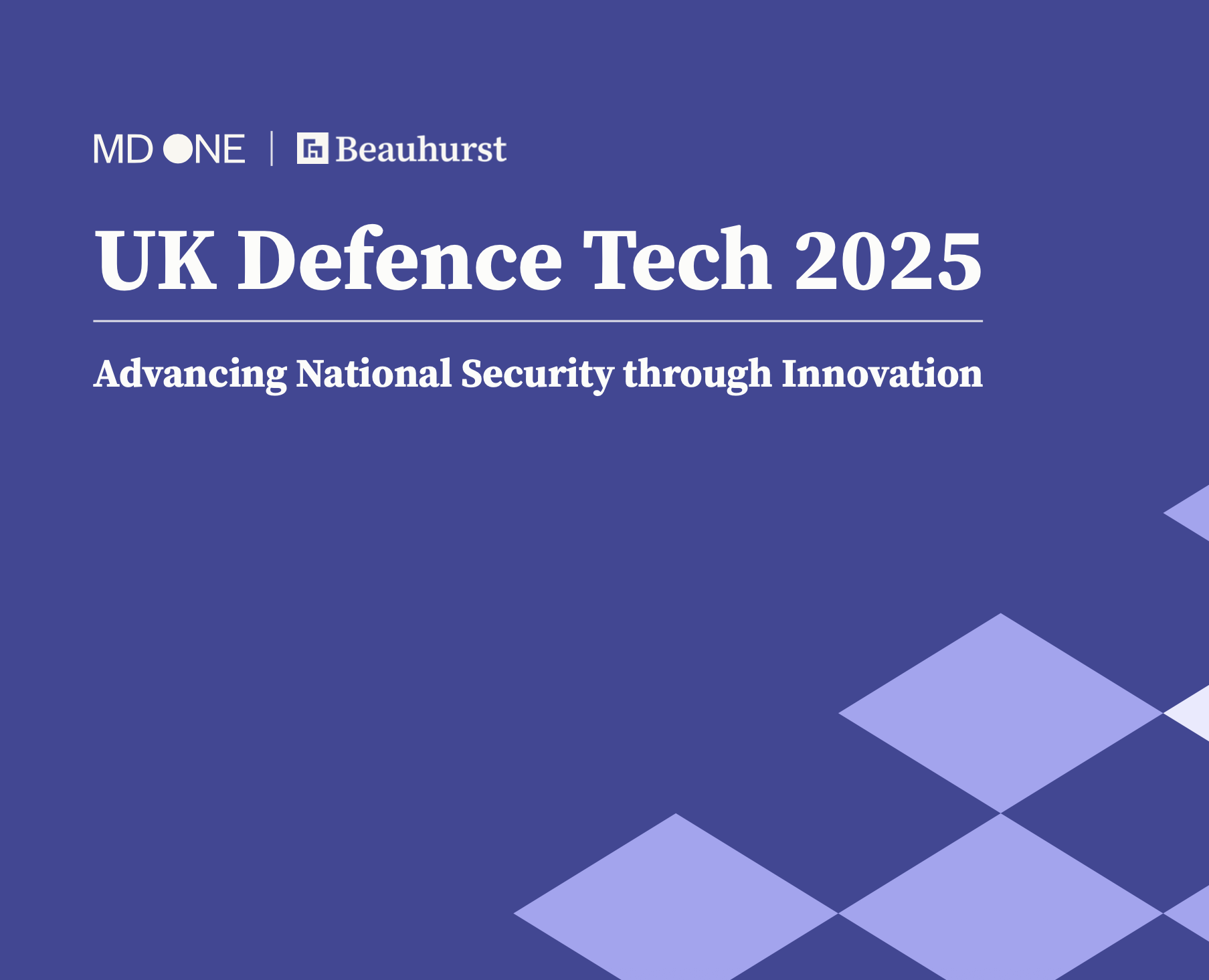An Interview with Lab-1 and Beauhurst

August 23, 2024
Beauhurst's Henry Whorwood and Lab-1 CEO Robin Brattel joined MD One in London to discuss market and sector dynamics.
Henry Whorwood writing for Beauhurst: Full story here.
I sat down with Lab 1 Co-founder and CEO Robin Brattel and Managing Partner at MD One Ventures Will McManners to get their thoughts on the cybersecurity sector, defence technology, and the wider investment landscape in the UK. Robin also shared insights about what have been the blockers as well as drivers of success in building his business.
Lab 1 operates an Exposed Data Intelligence (EDI) platform that collects and analyses data that has become exposed. Exposed data is sensitive information that has been revealed to an unauthorised party. Lab 1’s platform combines AI and big data capabilities with dark, deep and clear web knowledge, to analyse the full corpus of exposed data. The platform then uses AI to generate prescriptive insights.
Will and I started by asking Robin to tell us about his business, some of its successes and where the idea for Lab 1 came from.
“There are four founders and some were working on personal identity protection products, these are largely looking for cases where your credentials like your email address have been exposed,” Robin told us. However, the team noticed more was being exposed than just people’s credentials. “No one was looking at all the heterogeneous unstructured data being exposed.” The team combined their knowledge of the dark web, big data, AI and machine learning to understand what was in these unstructured datasets. “The founders thought it was quite a cool problem to take on.”
The Lab 1 platform is saving millions of days' worth of analysts' time when it comes to analysing data files. “It takes 60 minutes for an analyst to fully understand a file, so to get through the 50 million files we’ve analysed through the Lab 1 platform it would be 6.7m days of work.” Robin has had interest in the platform from some of the largest companies in the world, including Big 4 accountancy firms and Tier 1 banks.
The Perfect Storm
Robin said that several reasons are contributing to the increase in interest in the Lab 1 product, the combination of which he called “The Perfect Storm.”
“The first problem is more and more breaches.” he says “As the amount of investment into cybersecurity has increased, so has the number of breaches. Problem two is the increase in the size of the data. What you’re dealing with now has gone from megabytes to terabytes. And instead of one file, it’s millions of files. Criminals are also getting more sophisticated. They’re using AI and running targeted phishing, social engineering attacks and deep fakes.”
“We believe that the data that's leaking is the information they need to run the sophisticated attack. So by understanding the data that's exposed, you can reduce your risk of sophisticated attacks. I think everyone in the industry is starting to wake up to that problem. And I think that's why we have started seeing an increasing pull.”
Issues in the sector
Robin then went on to discuss some of the issues that he had experienced working in the cybersecurity sector, including applying for government contracts and navigating the procurement processes of large corporations.
“What I think has happened to procurement is that they have the regulatory framework they all operate in which means they have to do so much diligence work on new vendors that it makes it challenging to bring in a new vendor.” This occurs even though companies—especially those in the financial services industry—are under increasing regulatory pressure because of the amount of data that is being leaked and the risk that this creates for customers.
“Governments want RFPs (requests for proposals), tenders, and processes. We’ve put ourselves in for several grants and even when we’ve nailed the brief we don’t get looked at.” Will then asked Robin if he was told why he was rejected: “Sometimes you get feedback, but you can be left frustrated with no right of reply.” he said.
“If you’re a startup, you can’t afford to put all of your efforts into winning a tender with the government. You need to win fast or lose fast, losing slow is terrible. But once you’ve won a few customers, you’re a known commodity. You’ve probably got a better balance sheet, probably a few years older and you can probably incur the operational expenses involved with preparing and submitting a bid.”
Positives of the sector
Having discussed the issues of the cybersecurity sector, Will asked Robin if there were any standout positive movements and programs that kept him going.
“Really, accelerators are brilliant. We were on the FinTech Innovation Lab in London, which propelled us forward, got us our first round of proper funding and a bunch of serious advisors.” He also said how attending accelerators gives the company a boost in credibility for potential investors, having also attended the FinTech Innovation Lab in New York. “You’ve already been through quite a rigorous process to get on that in the first place and therefore you must be doing something right.” Robin went on to say that these programs have also helped him form relationships with potential customers.
Robin spoke about the importance of having good advisors when you are an inexperienced entrepreneur. “Everyone has to keep it as lean as possible,” Robin says, speaking about the slower periods when Lab 1 was not winning contracts or signing clients. “So be very careful about what you commit to. And that's a really hard thing to juggle because you can always spend more money because you can achieve more, but you are burning through cash quicker. That is a really hard thing to balance, and again, experience really helps there.”
The Investment landscape
We asked Robin his thoughts on the wider investment landscape and about the defence sector. He touched on the sectors that have been resilient to the recent downturns in equity funding and gave his thoughts on the state of the wider UK equity market.
“The two things that remain resilient are AI and security, and the fact that we’re in AI and security means we’re hitting all the sweet spots. Defence, AI, security and cyber, that’s the mix because of the way the geopolitical situation has changed.”
Robin then told us he felt the early-stage investment environment in the UK was very strong and gave us an insight into what venture capitalists are looking for when scouting for investment opportunities. “From his perspective, he wants businesses that have a cool idea, cool team, good product fit in the market and therefore he’s willing to put a big check behind it.” Robin also said that having several customers is important. “What VCs want is a proven product market fit and the company to have the ability to scale fast. So it’s not one customer giving you a load of money, the ideal is two or more customers.”
I then asked Robin whether building up a customer base to attract investment leads to the temptation to finance the company’s growth through its revenue instead of investment capital. “So you’re up against two competing forces. Challenge one is global giants. If we prove that exposed data intelligence is something the market wants our competitors aren't going to sit around and just let us take market share. If you build off revenue, you are going to grow slowly, miss the market opportunity and, at best, someone’s going to buy you, but as you won’t grow as big you won’t reach your potential, and at worse you may miss out entirely.”
“The second problem is resources. When you start to win more customers, you don't have the resources to service them, so are always throttled down your ability to bring new customers in.” For Lab 1, Robin said, these services include onboarding people and building the product. “If we can scale to meet this market opportunity, we can take a big share of the market and grow a bigger business.”
Will spoke about the state of funding in the UK defence sector. “Defence is in a rather strange position. Because there is a significant disconnect between what the narrative is telling us with what the data is telling us.” He then spoke on the paradox of private investment in defence in the UK. “It's interesting that at the market data level, we've seen resilience in core sectors where you've got products and technology growth, which is very exciting. But coupled with a specific service that is either demanded through customer perference or demanded through increasing material threat it seems that those sorts of niche combinations would be a good place to invest.”
Robin talked about the large organisations operating in the defence sector, known as “defence primes”. This includes companies like BAE Systems, Babcock International and Thales. For Robin, these companies could be Lab 1’s competition and are pouring money into innovation. Will suggested that these defence primes can create a positive situation for smaller companies, where SMEs can win a contract using their innovative technology and are then acquired by a defence prime. The founders of these smaller companies then make good money from the exit. I said this could suppress the sector, as founders typically aim for a big exit. However, in the defence sector, exits are more likely to be equity sales to large primes, which may be keeping a lid on the sector.
Will explained that it is important to put this in the context of spending in the sector. “The unfortunate reality is that the vast majority of sectors SME’s are limited to their national market alone. Within the national market, when you’re applying for these contracts, there’s normally only so much money available for a particular product or solution. Once revenue has been acquired, the budget isn’t going to double year on year or go up by 30% month on month, which ordinarily is one of the key drivers [to attract investment]. From a macro perspective, there are very transparent ceilings imposed at the national level.”
Reflections
My conversation with Robin and Will led us to discuss a range of topics. Robin spoke of his experiences working within the cybersecurity industry, expressing frustration with procurement processes but highlighting the positive impact accelerators have had on Lab 1. Will summed up the sector’s issues nicely when he said “We have a scenario where you have a new creation by a British startup, targeting one of the UK’s most important service industries, the financial services industry, and delivering a solution to this increasing problem. And even among those tailwinds, you are still having procurement problems.”
We also spoke about the investment landscape. Robin gave us some insight into the way that some venture capitalists approach finding investment opportunities and Will spoke about investment in the defence industry. We discussed resilient investment sectors, with Will stating that companies in these sectors “will find opportunities to pivot and grow into adjacent markets.” Will linked this to MD One’s “dual-use” investment strategy by saying “ Investing in companies operating across adjacent markets, such as cybersecurity, allows us to tap into the potential that these horizontal sectors offer and bring new ideas to the National Security user.”
About MD One
Founded in 2021, MD One is Europe's first National Security venture capital firm. With a flexible, founder-friendly approach, the team leverages deep sector expertise and a solid venture capital track record to invest in early-stage startups from Pre-Seed to Series A. They partner with exceptional founders developing dual-use technologies for commercial and governmental clients and aim to provide significant value through follow-on investments while remaining deeply committed to supporting visionary founders.
Recent News

2025 UK Defence Tech Report
MD One Ventures and Beauhurst release the 2025 Defence Technology Report

Materials Nexus discovers new rare-earth-free magnet using AI algorithm
MD One portfolio company announces 'MatNex', delivering a novel magnet 200x faster than traditional methods


